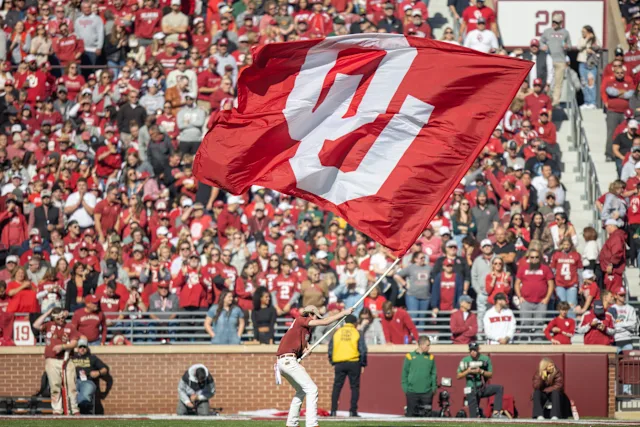The Oklahoma Sooners continue to shape their roster for the upcoming college football season by diving into the ever-active NCAA transfer portal, and their latest addition marks a significant move in the trenches. Head coach Brent Venables and his staff have officially landed a transfer defensive tackle, a crucial addition to a unit that struggled at times with consistency and depth during the previous campaign. The move underscores Oklahoma’s strategic focus on fortifying the defensive line, and it sends a clear message that the Sooners are serious about improving their physicality and presence up front as they prepare for their debut season in the SEC.
The newest member of the Sooners’ roster is Elijah Jackson, a 6-foot-4, 305-pound interior lineman who arrives in Norman after a productive stint at Maryland. Jackson, a former three-star recruit from Georgia, took a significant leap forward over the past two seasons in the Big Ten. Known for his strength at the point of attack and ability to clog running lanes, Jackson racked up 39 total tackles, 6.5 tackles for loss, and 3.0 sacks last season, earning All-Big Ten honorable mention honors. His blend of power, technique, and experience makes him a plug-and-play option for the Sooners, who are in search of immediate contributors on the defensive interior.
Brent Venables, widely regarded as one of the brightest defensive minds in college football, praised Jackson’s game intelligence, motor, and maturity during his official announcement. According to Venables, Jackson brings more than just size to the table—he’s a student of the game who understands leverage, gap responsibility, and situational football. The Oklahoma staff was particularly impressed by Jackson’s ability to anchor against double teams, collapse the pocket on passing downs, and play with consistent pad level. These traits are essential in the SEC, where offensive lines are elite and the battle in the trenches often determines the outcome of games.
The addition of Jackson couldn’t have come at a better time. Oklahoma’s defensive line, though improved last season, lacked the kind of depth and dominance that defined Venables-led defenses during his time as defensive coordinator at Clemson. Injuries, inexperience, and inconsistency plagued the interior rotation, forcing the Sooners to rely heavily on underclassmen and edge players to carry the load. With Jackson now in the fold, Oklahoma gains a reliable veteran presence who not only elevates the group’s talent floor but also adds leadership in a locker room filled with young potential.
Jackson’s decision to transfer was motivated by a desire to compete on a national stage and prepare for the next level. The SEC offers exactly that. Playing against top-tier offensive lines week in and week out provides a proving ground for NFL hopefuls, and Jackson is eager to embrace the challenge. In his commitment announcement, he cited Oklahoma’s coaching staff, player development program, and defensive scheme as the deciding factors. He believes Norman is the ideal place to take his game to the next level.
From a schematic standpoint, Jackson fits seamlessly into Oklahoma’s hybrid front. The Sooners mix even and odd fronts, often shifting their defensive line alignments to create mismatches and confusion. Jackson’s ability to play both as a one-technique and a three-technique gives the coaching staff valuable flexibility. He’s stout enough to anchor in the run game but quick enough to shoot gaps and disrupt plays in the backfield. His versatility allows Venables and defensive coordinator Ted Roof to be creative with their personnel groupings, bringing pressure from multiple angles while maintaining a solid core in the middle.
Off the field, Jackson is known as a high-character player with a relentless work ethic. Former Maryland teammates described him as a quiet leader—someone who lets his play do the talking but isn’t afraid to speak up when needed. He’s a film junkie who spends extra hours in the facility, constantly seeking ways to refine his technique and expand his football IQ. These intangible qualities made him especially attractive to the Sooners, who have emphasized culture and accountability in their rebuild.
Oklahoma’s recruiting strategy under Venables has been clear: identify talent that fits not only the athletic profile but also the cultural expectations of the program. With Jackson, the Sooners are getting a player who checks every box. He’s battle-tested, coachable, and hungry. More importantly, he understands what it means to wear the crimson and cream and is committed to leaving a legacy on and off the field.
The addition of Jackson also creates a ripple effect throughout the rest of the defensive line room. His presence raises the level of competition in practice, pushing younger players like Derrick LeBlanc, Kelvin Gilliam, and Gracen Halton to elevate their performance. For returning veterans such as Isaiah Coe and Jonah Laulu, Jackson adds another layer of experience and strength, giving Oklahoma the kind of depth that allows for more frequent rotations without a significant drop-off in production. That depth will be vital as the Sooners transition into SEC play, where brutal physicality and war-of-attrition games are the norm.
It also allows Oklahoma to be more aggressive defensively. With Jackson anchoring the middle, linebackers are free to flow to the football without worrying about getting washed out by offensive linemen. Edge rushers can be deployed more strategically, knowing that the interior push is there to collapse the pocket and flush quarterbacks into their path. That synergy between the defensive tackle and the rest of the front seven is a key component in Venables’ vision for a championship-caliber defense.
Beyond the immediate impact, Jackson’s arrival sends a message to future recruits and transfers: Oklahoma is serious about building a contender in the SEC. The Sooners are investing in the trenches, where games are won and lost, and are prioritizing players who bring both skill and substance. In today’s college football landscape, where rosters are more fluid than ever due to the portal, securing experienced, high-level talent like Jackson can make all the difference.
As for Jackson, he’s already begun integrating with his new teammates during spring workouts and has quickly earned the respect of the coaching staff and players alike. Coaches have been impressed with his attention to detail, his strength in the weight room, and his willingness to embrace Oklahoma’s demanding culture. Early reports suggest that he’s poised to be a vocal leader on the field and a mentor to the younger linemen in the program.
Looking ahead, expectations for Jackson are high—but so is his ceiling. If he continues on his current trajectory, he has the potential to be one of the most impactful transfer additions in the SEC this offseason. More than just a stopgap or depth piece, he represents a foundational building block in Oklahoma’s journey back to national prominence.
Venables and his staff will continue to work the portal and the recruiting trail as they finalize the roster for what is shaping up to be one of the most anticipated seasons in recent Oklahoma history. But for now, the addition of Elijah Jackson gives them something every great defense needs: a warhorse in the middle, ready to take on double teams, shut down the run, and lead by example.
As the Sooners continue their transition to life in the SEC, it’s players like Jackson who will help bridge the gap. Experienced, hungry, and battle-tested, he arrives in Norman with a chip on his shoulder and a goal in mind: help Oklahoma return to the top of college football—and dominate in the trenches while doing it.



